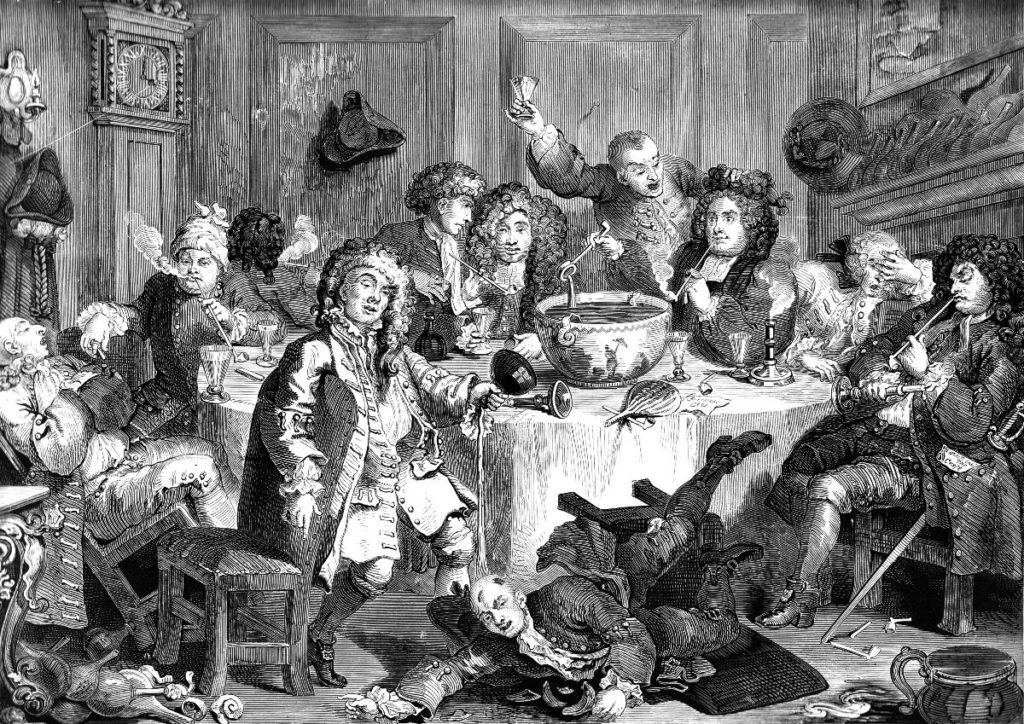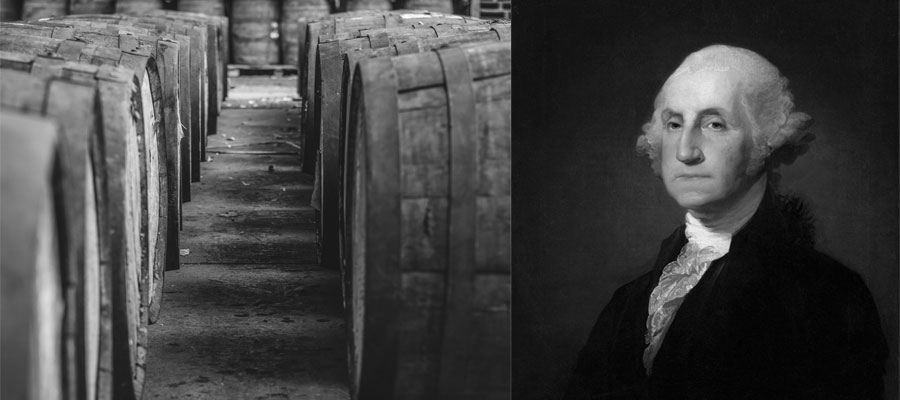In his book, “Annals of commerce”, David Macpherson writes that in 1731: “The consumption of rum in New-England is so great, […] that there have been 20,000 hogsheads of French melasses manufactured into rum at Boston in one year; and as every gallon of melasses will make a gallon rum, this will amount to 1 260 000 gallons of rum in one year, so vast is the demand for that liquor by their fishery and by the Indian trade.”
This statement alone could almost be used to summarise rum trade in the 18th century on the American continent. It mentions French molasses, rum production, rum navigating the seas and rum ending up in the hands of Indians. George Washington himself had a hand in the rum trade. In the year 1753 he was a major in the Virginia Militia and was sent to Ohio to resolve a territorial conflict with France. Behind this conflict lay another, concerning the trade of fur with the Indians. It was important for the French and the British to have the Indians on their side, since they constituted both trading partners and military allies. In this Ohio valley, Washington offered an Indian princess, Queen Aliquippa, a match coat and a bottle of rum, as a diplomatic gift. In his correspondence he wrote that the “latter was thought much the better present of the two.” The Indians’ taste for rum was such that they sometimes became uncontrollable. During the Seven Years’ War, which began in 1754, the French made the ill-judged decision not to use rum as an exchange currency, which pushed some directly into the arms of the British…
During this war, British soldiers could sometimes receive rum as an addition to their wages. This was especially the case for the soldiers of New-England. But food provisions in wartime were unpredictable, and in a letter addressed to Colonel Henry Bouquet, a Swiss mercenary in the British army, George Washington expressed his fear that rum would become rare.
But this did not stop him, when he stood in the elections at the House of Burgesses in Virginia, from handing out over 85 gallons and pints of rum and punch to convince voters… He didn’t win, but did gain a place in the House.
After the Seven Years’ War, won by the British, George Washington devoted himself to his plantation in Virginia. At this time, his ill-feelings towards Great Britain increased, as did those of other plantation owners, in large part due to the commercial laws they imposed. The reputation he had gained since the Seven Years’ War was so great that he was appointed Commander in chief of the Continental Army, the name given to the troops of the Thirteen Colonies, one year after the beginning of the War of Independence.
At the beginning of the war, the Americans were lacking in all areas: weapons, artillery, supplies, money, etc.… And, as had been the case in previous years, in certain cases rum became an integral part of military wages. The military staff tried to get supplies from all of the Caribbean islands. In 1775, two ships from Antigua brought 139 hogsheads of rum; a little over 400hl. This rum was intended for the army and navy in Boston. But whilst rum made up part of a soldier’s remuneration, it could also be used as a sanction; through withholding it.

The naval war accentuated the difficulties in acquiring provisions. Some of Washington’s letters mentioned ships that were captured, destroyed or victorious, containing rum and other vital food supplies in their holds. He also expressed his opinion on the balance that needed to be made between remuneration through rum and through shillings, at a time when the currency exchange rate was collapsing. It was therefore a time for making savings, as much for soldiers as for commanders.
John Adams, who played an important role in the War of Independence, and would later become president of the United States, details in his correspondence in 1777 the change in George Washington’s eating habits: “General Washington sets a fine example. He has banished wine from his table, and entertains his friends with rum and water. This is much to the honor of his wisdom, his policy, and his patriotism”.
Washington went as far as to express his regret, in a letter addressed to the Marquis de Lafayette on 4 July 1779, at not being able to distribute a generous amount of rum to the soldiers on the anniversary of the United States’ independence, so precious was the drink. From 1780, Washington regularly complained about the lack of rum, many of his regiments were deprived of it from then on and when a one-off ship arrived at Philadelphia with provisions and rum in July, the celebrations did not last long.
At the end of the war, legend has it that George Washington ordered two tonnes of rum to celebrate the victory. John Adams wrote that “[…] molasses was an essential ingredient in American Independence”.
The post-war years saw the mass return of rum to the American territory and a radical change of attitude from General Washington regarding the beverage. In 1788, he noted that in taverns, French spirits had been replaced by Jamaican rum. In Vermont, 24,000 gallons of rum, that is, over 900hl, were imported in one year. Washington wanted to rebalance trade between Britain and France. Rum from the British colonies was, in his opinion, “the bane of morals and the parent of idleness”.
Despite his political opinion of rum, Washington remained under certain constraints as a plantation owner. In his plantation he resigned himself to distributing rations of rum to his slaves during harvest, whilst complaining about the tradition, which began to slowly die away at the end of the 18th century. In 1797, two years before his death, George Washington added to his estate, building a distillery for… whisky.

